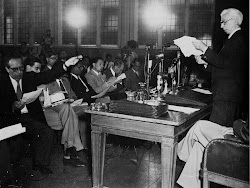 In a little known initiative, Pugwash provided a back channel (code named PENNSYLVANIA) between two French men and Ho Chi Minh during the Vietnam War.
In a little known initiative, Pugwash provided a back channel (code named PENNSYLVANIA) between two French men and Ho Chi Minh during the Vietnam War. "But what the public wasn't aware of, which I couldn't really describe or discuss when I left, was that we were engaged in very delicate negotiations. ... They had been triggered, oddly enough, by a visit that Henry Kissinger, who was then a professor at Harvard, had made to a Pugwash meeting in Paris. ... [T]hey were meeting in Paris in the summer of 1967. Kissinger was there, and he was approached by two Frenchmen, Herbert Marcovich and Raymond Aubrac*, whom I cite in the book, who said, "If the U.S. has a message to take to Ho Chi Minh, we'll deliver it." Now to illustrate the degree to which we didn't understand the situation in Vietnam at the time, today I believe that Ho Chi Minh was more of a nationalist, more of a Tito, than a servant or a follower of Khruschev. But at that time, we looked upon him as a vassal of the Soviets. He had lived in Paris during World War II, he had lived with this man Aubrac; he was the godfather of Aubrac's child. (By the way, Ho Chi Minh had been a pastry cook in the Savoy Hotel in London, and he lived in this country for a time.) There's a real possibility that if we had understood him better we could have avoided this war, or, after it started, we could have terminated it. It illustrates my point of how little we knew and understood the Vietnamese. But to come back to my point, I said to President Johnson "I know you think there's nothing in this, sir, but let me handle it. Something might come of it. I promise not to get us in trouble; let me handle it." So I engaged in a long series of exchanges with Kissinger with the full knowledge of the Secretary of State and the President over a period of months. "
"Our efforts failed, and I suggest why in the book: in part because we were clumsy and in part because maybe there was nothing in it, I don't know. But I know we were clumsy. In any event, our efforts failed, but they were still continuing when I left. After I left, the President, in March of 1968, made a speech in San Antonio in which he put forward publicly the elements of the proposal that we had put forward recretly through Kissinger to Ho Chi Minh, which became known as the San Antonio formula. That ultimately was the foundation for the start of the negotiations between North Vietnam and the U.S. in Paris. That was under way when I left; I couldn't talk publicly about it. As Secretary of Defense, when the United States was in the midst of a war with 500,000 American young people's lives at risk, in the
midst of a war in a foreign country, I couldn't speak candidly or freely without self-constraint." (emphasis added)*Some archival research indicates that this question of who contacted whom is a bit more complicated than this, but I will save that for another post!!
Recommended reading: Robert McNamara, James Blight, Robert Brigham, Argument Without End, Public Affairs, 2000, pp. 292-301. Photo above from the Kreisler interview website.


No comments:
Post a Comment